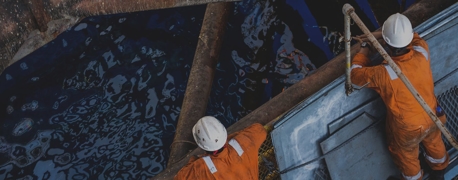Most Common Oil Rig Job Titles

Offshore oil rigs are isolated operations, consisting of hundreds of workers who perform a variety of tasks. From management positions and supporting roles to technical engineers, oil rigs require a range of workers to keep operating smoothly.
Oil rig jobs include, but are not limited to, the following:
- Assistant Driller – These offshore workers help the current drilling operations, and they are direct supervisors for derrickmen, roughnecks, and pumpmen.
- Ballast Controlman – These offshore workers are mostly responsible for ensuring that the rig is safe and stable at all times.
- Barge Engineer – As head of the Control Room, he supervises Control Room Operators (CROs) and their assistants.
- Chief Engineer – Oversees many operations, including the mechanical operations on board the rig.
- Company Man / Woman – Representatives of the company that funds the operations of the rig.
- Crane Operator – Heads up all crane operations on the rig and moving items from the supply boats. They also act as supervisors for roustabouts.
- CROs – Control Room Operators have varying tasks depending on the rig, but responsibilities include overseeing the transfer of liquids and controlling rig stability.
- Derrickman – Responsible for all operations in the mud pump room, including the holding pits and other machinery.
- Diver – Some rigs require the use of divers to maintain the underwater equipment.
- Driller – Heads up all operations related to the drilling equipment.
- Electrician – Maintains and repairs all electrical systems onboard the rig.
- Floorman – Provides general support to the rig's drilling operations.
- Motorman – Along with other mechanics, responsible for all mechanical operations on the rig, including the diesel generators.
- Pumpman – Assists the derrickman in the mud pump room.
- Rig Mechanic – Mechanics work with motormen to maintain the various kinds of maintenance on all mechanical parts of the rig.
- Rig Medic – The onboard medic takes care of injured or ill patients on the rig. Although not all are licensed doctors, most have a range of medical experience.
- Rig Welder – Welders are responsible for construction and repairs of metal equipment and machinery.
- Roughneck – Responsibilities include the operation of equipment and machines used in the current drilling task.
- Roustabouts – Responsible for using cranes to move loads around the deck and bringing equipment to the rig floor.
- Safety and Training Coordinator – Trainers ensure that all crew members are updated on safety procedures and organize training sessions.
- Storekeeper – Most rigs are equipped with a store for workers to purchase everything from basic needs to movies.
- Subsea Engineer – Responsible for many mechanisms that maintain the rig's stability, including the blowout preventer and the motion compensation system.
- Toolpusher – Supervises drilling departments and ensures that the rig is stocked with adequate tools and equipment.
Each of these roles is essential to maintaining the drilling operation through servicing the rig, coordinating its activities, or assisting the crew. It is essential for companies to train every worker in safety measures on the rig, such as color-coding the equipment and first aid techniques.
Even a small mistake or step in the wrong direction can put the entire crew in harm's way. To reduce the chance of an accident, rig workers need to ensure not only that they are working safely, but that their co-workers are too. If you have been injured in an oil rig accident, it is important that you understand your legal rights. If your injury was caused in part or whole by the mistake or carelessness of a co-worker or management, you could be entitled to compensation.
When the worst happens offshore, you need a firm with a proven record of success.
Contact our oil rig attorneys today for a free consultation.
- Categories


